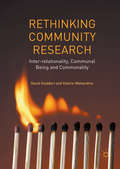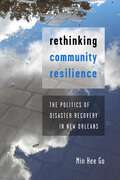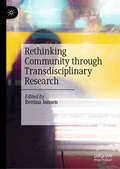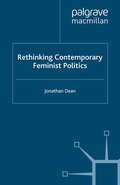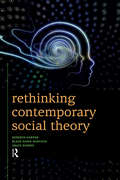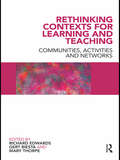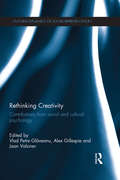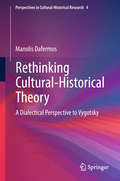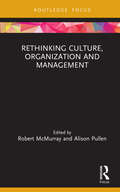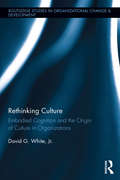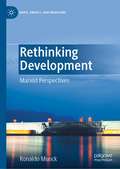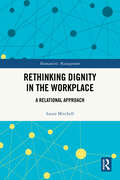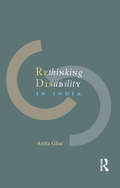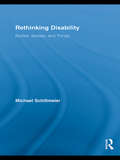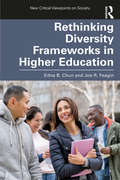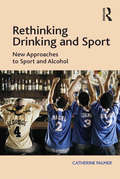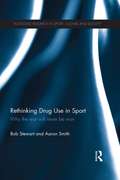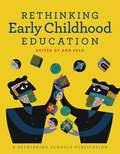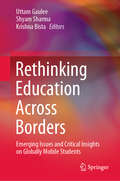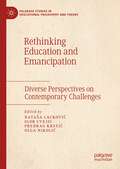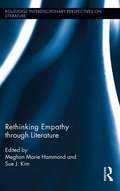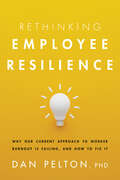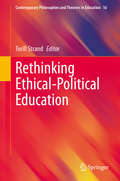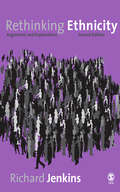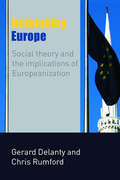- Table View
- List View
Rethinking Community Research
by David Studdert Valerie WalkerdineThis book sheds new light on the complex inter-relations that make up class, power, local history and space. It turns community thinking on its head by understanding community not as an object but as a relational process with sociality at its core. Based on fieldwork from one market town and the work of Hannah Arendt, it demonstrates how a new approach to social practices can illuminate our understanding of commonality and communal being. Whilst community has become both a much-derided and much-touted term, this thought-provoking work shows that it is at the heart of social process. It will appeal to researchers of sociology, social policy, politics, public health and geography, as well as those involved in public policy design and implementation.
Rethinking Community Resilience: The Politics of Disaster Recovery in New Orleans
by Min Hee GoExplores the unintended consequences of civic activism in a disaster-prone cityAfter Hurricane Katrina, thousands of people swiftly mobilized to rebuild their neighborhoods, often assisted by government organizations, nonprofits, and other major institutions. In Rethinking Community Resilience, Min Hee Go shows that these recovery efforts are not always the panacea they seem to be, and can actually escalate the city’s susceptibility to future environmental hazards. Drawing upon interviews, public records, and more, Go explores the hidden costs of community resilience. She shows that—despite good intentions—recovery efforts after Hurricane Katrina exacerbated existing race and class inequalities, putting disadvantaged communities at risk. Ultimately, Go shows that when governments, nonprofits, and communities invest in rebuilding rather than relocating, they inadvertently lay the groundwork for a cycle of vulnerabilities. As cities come to terms with climate change adaptation—rather than prevention—Rethinking Community Resilienceprovides insight into the challenges communities increasingly face in the twenty-first century.
Rethinking Community through Transdisciplinary Research
by Bettina JansenThis book offers the first interdisciplinary survey of community research in the humanities and social sciences to consider such diverse disciplines as philosophy, religious studies, anthropology, sociology, disabilities studies, linguistics, communication studies, and film studies. Bringing together leading international experts, the collection of essays critically maps and explores the state of the art in community research, while also developing future perspectives for a cross-disciplinary rethinking of community. Pursuing such a critical, transdisciplinary approach to community, the book argues, can counteract reductive appropriations of the term ‘community’ and, instead, pave the way for a novel assessment of the concept’s complexity. Since community is, above all, a lived practice that shapes people’s everyday lives, the essays also suggest ways of redoing community; they discuss concrete examples of community practice, thereby bridging the gap between scholars and activists working in the field.
Rethinking Contemporary Feminist Politics: Shared Values In Uncertain Times (Gender and Politics)
by J. DeanRethinking Contemporary Feminist Politics puts forward a timely analysis of contemporary feminism. Critically engaging with both narratives of feminist decline and re-emergence, it draws on poststructuralist political theory to assess current forms of activism in the UK and present a provocative account of recent developments in feminist politics.
Rethinking Contemporary Social Theory
by Black Hawk Hancock Roberta Garner Grace BudrysThe authors recontextualize contemporary sociological theory to argue that in recent decades sociology has been deeply permeated by a new paradigm, conflict constructionism. Their analysis integrates and sheds new light on eight prominent domains of recent social thought: the micro-level; discourses, framing, and renewed interest in signs and language; the construction of difference and dominance; regulation and punishment; cultural complexity and transculturation; the body; new approaches to the role of the state; and a consistent conflict perspective.The paradigm combines elements of both social construction theory and conflict theory. It has deep roots in critical theory and more recent links to postmodernism. It is associated with postmodern social thought, although it is less radical and more adaptable to empirical inquiry than postmodernism. The authors tie their new conceptualization of social theory to contemporary applications of social theory in everyday life. Features of this text:
Rethinking Contexts for Learning and Teaching: Communities, Activites and Networks
by Richard Edwards Gert Biesta Mary ThorpeNow that learning is seen as lifelong and lifewide, what specifically makes a learning context? What are the resultant consequences for teaching practices when working in specific contexts? Drawing upon a variety of academic disciplines, Rethinking Contexts for Learning and Teaching explores some of the different means of understanding teaching and learning, both in and across contexts, the issues they raise and their implications for pedagogy and research. It specifically addresses What constitutes a context for learning? How do we engage the full resources of learners for learning? What are the relationships between different learning contexts? What forms of teaching can most effectively mobilise learning across contexts? How do we methodologically and theoretically conceptualise contexts for learning? Drawing upon practical examples and the UK’s TLRP, this book brings together a number of leading researchers to examine the assumptions about context embedded within specific teaching and learning practices. It considers how they might be developed to extend opportunity by drawing upon learning from a range of contexts, including schools, colleges, universities and workplaces.
Rethinking Creativity: Contributions from social and cultural psychology (Cultural Dynamics of Social Representation)
by Jaan Valsiner Vlad Petre Glăveanu Alex GillespieDespite more than half a century of psychological research on creativity we are still far from a clear understanding of the creative process, its antecedents and consequences and, most of all, the ways in which we can effectively support creativity. This is primarily due to a narrow focus on creative individuals isolated from culture and society. Rethinking Creativity proposes a fundamental review of this position and argues that creativity is not only a psychological but a sociocultural phenomenon. This edited volume aims to relocate creativity from inside individual minds to the material, symbolic and social world of culture. It brings together eminent social and cultural psychologists who study dynamic, transformative and emergent phenomena, and invites them to conceptualise creativity in ways that depart from mainstream definitions and theoretical models existing in past and present literature on the topic. Chapters include reflections on the relationship between creativity and difference, creativity as a process of symbolic transformation, the role of apprenticeships and collaboration, the importance of considering materiality and affordances in creative work, and the power of imagination to construct individual trajectories. The diverse contributions included in this book offer readers multiple pathways into the intricate relationship between mind, culture, and creativity, and invite them to rethink these phenomena in ways that foster creative action within their own life and the lives of those around them. It will be of key interest to both social and cultural psychologists, as well as to creativity researchers and those who, as part of their personal or professional life, try to understand creativity and develop creative forms of expression.
Rethinking Cultural-Historical Theory: A Dialectical Perspective To Vygotsky (Perspectives In Cultural-historical Research Ser. #4)
by Manolis DafermosThis book is an exploration of science in the making. It offers readers the opportunity to critically reflect on the process of development of Vygotsky's research program from the perspective of dialectics, focusing on the dramatic process of building and rebuilding cultural historical theory. Vygotsky's creative and dramatic journey is no less important than the concrete results of his research. An epistemological and historical investigation of the formulation of cultural historical theory sheds light on the process of knowledge production and reveals hidden dimensions of creativity in science.
Rethinking Culture, Organization and Management (Routledge Focus on Women Writers in Organization Studies)
by Alison Pullen Robert McMurrayThe purpose of this book is to reimagine the concept of culture, both as an analytical category and disciplinary practice of dominance, marginalization and exclusion. For decades culture has been perceived as a ‘hot topic’. It has been written about and deployed as part of ‘a search for excellence’; as a tool through which to categorise, rank, motivate and mould individuals; as a part of an attempt to align individual and corporate goals; as a driver of organizational change, and; as a servant of profit maximisation. The women writers presented in this book offer a different take on culture: they offer useful disruptions to mainstream conceptions of culture. Joanne Martin and Mary Douglas provide multi-dimensional holistic accounts of social relations that point up similarity and difference. Rather than offering totalising or prescriptive models, each author considers the complex, polyphonic and processual nature of culture(s) while challenging us to acknowledge and work with ambiguity, fluidity and disruption. In this spirit writings of Judi Marshall, Arlie Hochschild, Kathy Ferguson, Luce Irigaray and Donna Haraway are employed to disrupt extant management cultures that lionise the masculine and marginalise the concerns, perspectives and contributions of women and the diversity of women. These writers bring bodies, emotions, difference, resistance and politics back to the centre stage of organizational theory and practice. They open us up to the possibility of cultures suffused with multifarious potentiality rather than homogeneity and faux certainty. As such, they offer new ways of understanding and performing culture in management and organization. This book will be relevant to students and researchers across business and management, organizational studies, critical management studies, gender studies and sociology.
Rethinking Culture: Embodied Cognition and the Origin of Culture in Organizations (Routledge Studies in Organizational Change & Development)
by David G. WhiteOrganizational or corporate ‘culture’ is the most overused and least understood word in business, if not society. While the topic has been an object of keen academic interest for nearly half a century, theorists and practitioners still struggle with the most basic questions: What is organizational culture? Can it be measured? Is it a dependent or independent variable? Is it causal in organizational performance, and, if so, how? Paradoxically, managers and practitioners ascribe cultural explanations for much of what constitutes organizational behavior in organizations, and, moreover, believe culture can be engineered to their own designs for positive business outcomes. What explains this divide between research and practice? While much academic research on culture is challenged by ontological, epistemic and ethical difficulties, there is little empirical evidence to show culture can be deliberately shaped beyond espoused values. The gap between research and practice can be explained by one simple reason: the science and practice of culture has yet to catch up to managerial intuition.Managers are correct in suspecting culture is a powerful normative force, but, until now, current theory and research is not able to adequately account for cultural behavior in organizations. Rethinking Culture describes and presents evidence for a new framework of organizational culture based on the cognitive science of the so-called cultural mind. It will be of relevance to academics and researchers with an interest in business and management, organizational culture, and organizational change, as well as cognitive and cultural anthropologists and sociologists interested in applications of theory in organizational and institutional settings.
Rethinking Development: Marxist Perspectives (Marx, Engels, and Marxisms)
by Ronaldo MunckDevelopment and underdevelopment are the main determinants of life-chances worldwide, arguably more so than social class. Marxism, as the underlying theory for social revolution, needs to have a clear understanding of the dynamics of development and social progress. Exploring the intersection of Marxism and development, this book looks at Marx’s original conception of capitalist development and his later engagement with under-developed Russia. The author also reviews Lenin’s early critique of the Russian populists' rejection of capitalism compared with his later analysis of imperialism as a brake on development in the non-European world. The book then considers Rosa Luxemburg, who arguably provides a bridge between these theorists and those that follow with her analysis of imperialism as a necessity for capitalism to incorporate non-capitalist lands. Turning then to the non-European world, the author examines the Latin American dependency theories, the post-development school and the recent indigenous development theories advanced by Andean Marxism. Finally, Munck addresses the relationship between globalization and development. Does this relationship suggest that it has not been capitalism but a lack of capitalism that has led to under-development?
Rethinking Dignity in the Workplace: A Relational Approach (Humanistic Management)
by Laura MitchellDignity in the context of work organisations has been explored by a range of scholars globally, yet the potential of this interdisciplinary concept is overwhelmed by our commitment to outdated philosophies and the narrow paradigmatic concerns of academic subdisciplines. Bringing together the work of sociologists, philosophers, political theorists, and a wide selection of business and management scholarship, this book highlights areas in which ‘workplace’ dignity needs a rethink. Starting with the foundational philosophical assumptions, this book challenges a deontological ethic and a simple atomistic view of persons. A specific thesis of dignity as emergent from social performance is presented which is informed by symbolic interactionism, actor-network theory, and liberal and feminist philosophy. With organisational examples throughout, this radical rethink has serious implications not only for the study of dignity in the context of contemporary work activity but also respecifies how we think about our obligations to ourselves and others in networks of relations.
Rethinking Disability in India
by Anita GhaiMoving away from clinical, medical or therapeutic perspectives on disability, this book explores disability in India as a social, cultural and political phenomenon, arguing that this `difference' should be accepted as a part of social diversity. It further interrogates the multiple issues of identification of the disabled and the forms of oppressio
Rethinking Disability: Bodies, Senses, and Things (Routledge Studies in Science, Technology and Society)
by Michael SchillmeierThis text is a critical and empirically-based introduction to disability studies. It offers a comprehensive, book-length analysis of disability through the lens of Science and Technology Studies (STS), and presents a practice-oriented discussion of how bodies, senses and things are linked in everyday life and configure "enabling" and "disabling" scenarios. Relevant to a broad spectrum of medical practitioners and practicing social service workers, the book will also be essential reading in the fields of disability studies, sociology of the body/senses, medical sociology and STS.
Rethinking Diversity Frameworks in Higher Education
by Joe R. Feagin Edna B. ChunWith the goal of building more inclusive working, learning, and living environments in higher education, this book seeks to reframe understandings of forms of everyday exclusion that affect members of nondominant groups on predominantly white college campuses. The book contextualizes the need for a more robust analysis of persistent patterns of campus inequality by addressing key trends that have reshaped the landscape for diversity, including rapid demographic change, reduced public spending on higher education, and a polarized political climate. Specifically, it offers a critique of contemporary analytical ideas such as micro-aggressions and implicit and unconscious bias and underscores the impact of consequential discriminatory events (or macro-aggressions) and racial and gender-based inequalities (macro-inequities) on members of nondominant groups. The authors draw extensively upon interview studies and qualitative research findings to illustrate the reproduction of social inequality through behavioral and process-based outcomes in the higher education environment. They identify a more powerful systemic framework and conceptual vocabulary that can be used for meaningful change. In addition, the book highlights coping and resistance strategies that have regularly enabled members of nondominant groups to address, deflect, and counteract everyday forms of exclusion. The book offers concrete approaches, concepts, and tools that will enable higher education leaders to identify, address, and counteract persistent structural and behavioral barriers to inclusion. As such, it shares a series of practical recommendations that will assist presidents, provosts, executive officers, boards of trustees, faculty, administrators, diversity officers, human resource leaders, diversity taskforces, and researchers as they seek to implement comprehensive strategies that result in sustained diversity change.
Rethinking Drinking and Sport: New Approaches to Sport and Alcohol
by Catherine PalmerRethinking Drinking and Sport examines the complex nature of sport-related drinking. With close attention to the contradictory nature of sport-related drinking, this book considers both 'the problem' of drinking in sport, as well as some of the issues for treatment and recovery that sports-related drinking presents. Bringing together a range of methodological and theoretical debates that address the relationships between alcohol and sport, Rethinking Drinking and Sport draws on rich new interview material with fans and both drinking and non-drinking sportsmen and women, as well as documentary and media sources. Based on research across a variety of sports in the UK and Australia, Rethinking Drinking and Sport explores not only the relationship between alcohol, fans, participants and industry, but also questions of gender and identity to provide fresh insights into the complex relationships between drinking and sport. Examining possible directions for health and public policy in relation to sport-related drinking, this book will appeal to social scientists and policy makers with interests in consumption, leisure, sport, drinking, and health.
Rethinking Drug Use in Sport: Why the war will never be won (Routledge Research in Sport, Culture and Society)
by Bob Stewart Aaron SmithDrug free sport is an unattainable aspiration. In this critical, paradigm-shifting reappraisal of contemporary drug policy in sport, Bob Stewart and Aaron Smith argue that drug use in sport is an inexorable consequence of the nature, structure and culture of sport itself. By de-mythologising and de-moralising the assumptions that prop up current drug management controls, and re-emphasising the importance of the long-term well being and civil rights of the athlete, they offer a powerful argument for creating a legitimate space for drug use in sport. The book offers a broad ranging overview of the social and commercial pressures impelling drug use, and maps the full historical and social extent of the problem. With policy analysis at the centre of the discussion, the book explores the complete range of social, management, policy, scientific, technological and health issues around drugs in sport, highlighting the irresolvable tension between the zero-tolerance model as advanced by WADA and the harm-reduction approach adopted by drug education and treatment agencies. While there are no simple solutions, as long as drugs use is endemic in wider society the authors argue that a more nuanced and progressive approach is required in order to safeguard and protect the health, social liberty and best interests of athletes and sports people, as well as the value of sport itself.
Rethinking Early Childhood Education
by Ann PeloIt shows how educators can nurture empathy, ecological consciousness, curiosity, collaboration, and activism in young children. It invites readers to rethink early childhood education, reminding them that it is inseparable from social justice and ecological education. An outstanding resource for childcare providers, early-grade teachers, and teacher education and staff development programs.
Rethinking Education Across Borders: Emerging Issues and Critical Insights on Globally Mobile Students
by Shyam Sharma Krishna Bista Uttam GauleeThis book focuses on critical issues and perspectives concerning globally mobile students, aspects that have grown in importance thanks to major geopolitical, economic, and technological changes around the globe (i.e., in and across major origins and destinations of international students). Over the past few decades, the field of international higher education and scholarship has developed robust areas of research that guide current policy, programs, and pedagogy. However, many of the established narratives and wisdoms that dominate research agendas, scope, and foci have become somewhat ossified and are unable to reflect recent political upheavals and other changes (e.g. the Brexit, Trump era, and Belt and Road Initiative) that have disrupted a number of areas including mobility patterns and recruitment practices, understanding and supporting students, engagement of global mobile students with their local counterparts, and the political economy of international education at large. By re-assessing established issues and perspectives in light of the emerging global/local situations, the contributing authors – all experts on international education – share insights on policies and practices that can help adapt to emerging challenges and opportunities for institutions, scholars, and other stakeholders in international higher education. Including theoretical, empirical, and practitioner-based methods and perspectives provided by scholars from around the world, the book offers a unique and intriguing resource.
Rethinking Education and Emancipation: Diverse Perspectives on Contemporary Challenges (Palgrave Studies in Educational Philosophy and Theory)
by Nataša Lacković Igor Cvejic Predrag Krstić Olga NikolićThis edited collection responds to the contemporary need for deeper analysis and rethinking of the relation between education and emancipation in a world beset by social, digital, educational and ecological crises. Among the diverse interdisciplinary perspectives explored are: rethinking the Anthropocene in the time of environmental emergency, the concept of relational thinking as emancipatory practice and a more encompassing concept of relational pedagogy that includes questions about the environment and digitalisation, the notion of indoctrination from the perspective of political education, reconnecting with the body as a form of emancipatory education and how schools reproduce socio-cultural ideologies in synergy with material and visual culture. The book chapters also consider the role of social media, postcolonialism and feminism in understanding emancipatory education and a historical reception of John Dewey’s ideas in other than Western contexts. This volume will be of interestto those seeking well-known as well as further and novel acquaintance with the philosophical and critical issues surrounding different forms and ideas of emancipation and/or/through education, including related practical propositions and examples. Educators, scholars in education, social justice, philosophy, sociology and curriculum developers will find this collection valuable in contemplating, practising and theorising the futures of emancipatory education across contexts and themes.
Rethinking Empathy through Literature (Routledge Interdisciplinary Perspectives on Literature)
by Sue J. Kim Meghan Marie HammondIn recent years, a growing field of empathy studies has started to emerge from several academic disciplines, including neuroscience, social psychology, and philosophy. Because literature plays a central role in discussions of empathy across disciplines, reconsidering how literature relates to "feeling with" others is key to rethinking empathy conceptually. This collection challenges common understandings of empathy, asking readers to question what it is, how it works, and who is capable of performing it. The authors reveal the exciting research on empathy that is currently emerging from literary studies while also making productive connections to other areas of study such as psychology and neurobiology. While literature has been central to discussions of empathy in divergent disciplines, the ways in which literature is often thought to relate to empathy can be simplistic and/or problematic. The basic yet popular postulation that reading literature necessarily produces empathy and pro-social moral behavior greatly underestimates the complexity of reading, literature, empathy, morality, and society. Even if empathy were a simple neurological process, we would still have to differentiate the many possible kinds of empathy in relation to different forms of art. All the complexities of literary and cultural studies have still to be brought to bear to truly understand the dynamics of literature and empathy.
Rethinking Employee Resilience: Why Our Current Approach to Worker Burnout is Failing, and How to Fix It
by Dan PeltonRethinking Employee Resilience is a practical, evidence-based guide to creating workplaces that invest in their workforce - the backbone of every organization. In an era of institutional collapse, workforce resilience isn&’t a luxury; it&’s non-negotiable. Burnout has quietly become the new normal. As trust in institutions crumbles and career stability feels like a relic of the past, organizations face a choice: cling to outdated models or redefine their cultures to prioritize human resilience. This book challenges the self-help industry&’s one-size-fits-all narrative, reframing burnout as a systemic issue embedded within organizational culture. It unfolds in three parts: debunking common burnout myths, redefining employee resilience, and offering tailored &‘on-ramps&’ for organizations of all sizes. Drawing from his work as a clinical psychologist in Afghanistan, where he provided mental health care to thousands of soldiers, to a decade leading mental health initiatives in management consulting, Dr. Dan Pelton has seen how burnout takes root—and knows how to dismantle it.Rethinking Employee Resilience isn&’t just another leadership manual filled with hollow platitudes. This book rejects the status quo — an unconventional guide for leaders and employees to transform organizational culture, grounded in empirical research, industry insights, and real-world experience.
Rethinking Ethical-Political Education (Contemporary Philosophies and Theories in Education #16)
by Torill StrandThis book offers a variety of outlooks and perspectives on the constitutive values and formative norms of a society, reflected by discourses on ethical-political education. It also discusses conceptual and critical philosophical works combined with empirical studies.The book is divided into three parts: the first part describes contemporary youth’s tangible experience of and reflections on ethical-political issues, while the second part explores the potential powers and pitfalls of educational philosophies, old and new. The third part highlights cutting edge issues within the humanities and social sciences, and examines the prospects of a fruitful rethinking of ethical-political education in response to today’s pressing issues. By addressing current dilemmas with diligence and insight, the authors offer solid arguments for new theoretical and practical directions to promote philosophical clarification and advance research. Intended for students, teachers and researchers, the book provides fresh perspectives on the many facets of ethical-political education, and as such is a valuable contribution to educational research and debate.
Rethinking Ethnicity: Arguments And Explorations
by Richard P. Jenkins"A welcome and brilliantly crafted overview of this field. It represents a major advance in our understanding of how ethnicity works in specific social and cultural contexts. The second edition will be an invaluable resource for both students and researchers alike." - John Solomos, City University, London The first edition of Rethinking Ethnicity quickly established itself as a popular text for students of ethnicity and ethnic relations. This fully revised and updated second edition adds new material on globalization and the recent debates about whether ethnicity matters and ethnic groups actually exist. While ethnicity - as a social construct - is imagined, its effects are far from imaginary. Jenkins draws on specific examples to demonstrate the social mechanisms that construct ethnicity and the consequences for people's experience. Drawing upon rich case study material, the book discusses such issues as: the 'myth' of the plural society; postmodern notions of difference; the relationship between ethnicity, 'race' and nationalism; ideology; language; violence and religion; and the everyday construction of national identity.
Rethinking Europe: Social Theory and the Implications of Europeanization
by Gerard Delanty Chris RumfordDominant approaches to the transformation of Europe ignore contemporary social theory interpretations of the nature and dynamics of social change. Here, Delanty and Rumford argue that we need a theory of society in order to understand Europeanization. This book advances the case that Europeanization should be theorized in terms of: globalization major social transformations that are not exclusively spear-headed by the EU the wider context of the transformation of modernity. This fascinating book broadens the terms of the debate on Europeanization, conventionally limited to the supersession of the nation-state by a supra-national authority and the changes within member states consequent upon EU membership. Demonstrating the relevance of social theory to contemporary issues and with a focus on European transformation rather than simplistic notions of Europe-building, this truly multidisciplinary volume will appeal to readers from a range of social science disciplines, including sociology, geography, political science and European studies.
